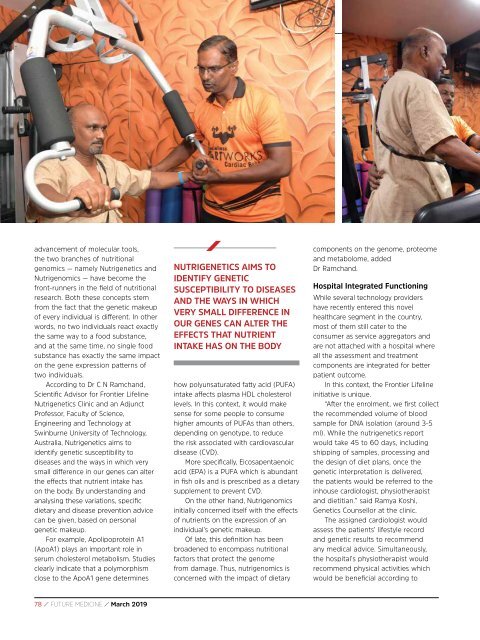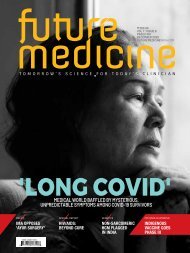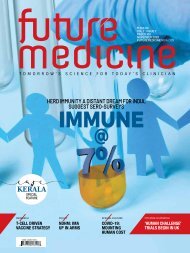March 2019 digital v1
You also want an ePaper? Increase the reach of your titles
YUMPU automatically turns print PDFs into web optimized ePapers that Google loves.
slug<br />
advancement of molecular tools,<br />
the two branches of nutritional<br />
genomics — namely Nutrigenetics and<br />
Nutrigenomics — have become the<br />
front-runners in the field of nutritional<br />
research. Both these concepts stem<br />
from the fact that the genetic makeup<br />
of every individual is different. In other<br />
words, no two individuals react exactly<br />
the same way to a food substance,<br />
and at the same time, no single food<br />
substance has exactly the same impact<br />
on the gene expression patterns of<br />
two individuals.<br />
According to Dr C N Ramchand,<br />
Scientific Advisor for Frontier Lifeline<br />
Nutrigenetics Clinic and an Adjunct<br />
Professor, Faculty of Science,<br />
Engineering and Technology at<br />
Swinburne University of Technology,<br />
Australia, Nutrigenetics aims to<br />
identify genetic susceptibility to<br />
diseases and the ways in which very<br />
small difference in our genes can alter<br />
the effects that nutrient intake has<br />
on the body. By understanding and<br />
analysing these variations, specific<br />
dietary and disease prevention advice<br />
can be given, based on personal<br />
genetic makeup.<br />
For example, Apolipoprotein A1<br />
(ApoA1) plays an important role in<br />
serum cholesterol metabolism. Studies<br />
clearly indicate that a polymorphism<br />
close to the ApoA1 gene determines<br />
NUTRIGENETICS AIMS TO<br />
IDENTIFY GENETIC<br />
SUSCEPTIBILITY TO DISEASES<br />
AND THE WAYS IN WHICH<br />
VERY SMALL DIFFERENCE IN<br />
OUR GENES CAN ALTER THE<br />
EFFECTS THAT NUTRIENT<br />
INTAKE HAS ON THE BODY<br />
how polyunsaturated fatty acid (PUFA)<br />
intake affects plasma HDL cholesterol<br />
levels. In this context, it would make<br />
sense for some people to consume<br />
higher amounts of PUFAs than others,<br />
depending on genotype, to reduce<br />
the risk associated with cardiovascular<br />
disease (CVD).<br />
More specifically, Eicosapentaenoic<br />
acid (EPA) is a PUFA which is abundant<br />
in fish oils and is prescribed as a dietary<br />
supplement to prevent CVD.<br />
On the other hand, Nutrigenomics<br />
initially concerned itself with the effects<br />
of nutrients on the expression of an<br />
individual’s genetic makeup.<br />
Of late, this definition has been<br />
broadened to encompass nutritional<br />
factors that protect the genome<br />
from damage. Thus, nutrigenomics is<br />
concerned with the impact of dietary<br />
components on the genome, proteome<br />
and metabolome, added<br />
Dr Ramchand.<br />
Hospital Integrated Functioning<br />
While several technology providers<br />
have recently entered this novel<br />
healthcare segment in the country,<br />
most of them still cater to the<br />
consumer as service aggregators and<br />
are not attached with a hospital where<br />
all the assessment and treatment<br />
components are integrated for better<br />
patient outcome.<br />
In this context, the Frontier Lifeline<br />
initiative is unique.<br />
“After the enrolment, we first collect<br />
the recommended volume of blood<br />
sample for DNA isolation (around 3-5<br />
ml). While the nutrigenetics report<br />
would take 45 to 60 days, including<br />
shipping of samples, processing and<br />
the design of diet plans, once the<br />
genetic interpretation is delivered,<br />
the patients would be referred to the<br />
inhouse cardiologist, physiotherapist<br />
and dietitian.” said Ramya Koshi,<br />
Genetics Counsellor at the clinic.<br />
The assigned cardiologist would<br />
assess the patients’ lifestyle record<br />
and genetic results to recommend<br />
any medical advice. Simultaneously,<br />
the hospital’s physiotherapist would<br />
recommend physical activities which<br />
would be beneficial according to<br />
78 / FUTURE MEDICINE / <strong>March</strong> <strong>2019</strong>


















